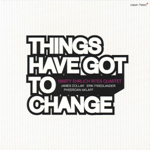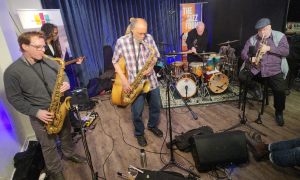Home » Jazz Articles » Live Review » Manhattan Transfer: Live in Albany, NY
Manhattan Transfer: Live in Albany, NY
The Egg
Albany, N.Y.
Sept. 25, 2009
The Manhattan Transfer vocal group—they of the multiple Grammy awards (10) and strong allegiance to jazz—shows no signs of wear and tear after some 35 years performing and recording.
The group has just released The Chick Corea Songbook on Four Quarters Entertainment, and is on tour doing some of that music as well as an assortment of pieces from their prestigious history. After a week at New York City's Blue Note, the group made a stop at The Egg in Albany, N.Y., which found them in the same form they have always maintained, which is first rate.
While the label is touting the group's 40th anniversary, the group solidly known as the Manhattan Transfer—Tim Hauser, Janis Siegel, Allan Paul and Cheryl Bentyne—began in 1974 with the sole change being Laurel Masse before Bentyne. After just a few years in the group, Masse was in a bad automobile accident and left the group. Bentyne joined at that point, 1978, and has been there ever since. (A version of the group, with Hauser and five others, did a forgettable album in 1971).
The idea for a project with Chick Corea's music goes back to the 1970s and conversations between Hauser and the pianist, who liked the idea. It was just one of those things that never happened, amid the busy careers of all involved. The group has expressed their joy working with the music and the resulting CD is another example of its creativity, working their harmonies, and also appropriate solos, into the music penned by Corea. It's no small task, and the result is memorable.
They don't just take music and do vocalese renditions of the original. "Spain," for example, is done with a much slower, funkier arrangement than what fans are used to from Corea or others that cover it. Janis Siegel's solo sparkled, as did the electric keyboard or the band's longtime musical director Yaron Gershovsky.
Others on the Albany set list were "One Step Closer (The One Step)," a slow swinger that seemed to get somewhat maudlin, and a nice version of "Time's Lie," which Flora Purim put on her popular Open Your Eyes, You Can Fly album in 1976 (Milestone). Strong numbers on the consistently good recording include "Free Samba," "500 Miles high" and "Armando's Rhumba," which the Transfer redubs "The Story of Anna and Armando."
But the show wasn't all about the challenging new music. The group jumped right out of the gate—swung right out of the gate perhaps more apropos—with "You Can Depend On Me" and it was evident from the start that the rich four-part harmony, rhythmic mixes and great sense of time hasn't changed a bit. Horace Silver's "Doodlin" was a lush medium-tempo number on which Bentyne showed her great sound. She has a rich voice that can bring out beautiful deep tones as well as range into soprano, supplying the high end in the foursome's harmonic work.
They're backed by just a quartet, but Gershovsky knows their every move and plays not just the right accompaniment, but good solos. The wonderful Steve Hass has done other tours with the Transfer and is right on with every shift and every change, without which the music could risk faltering. Bassist Gary Wicks was a strong presence on acoustic and electric, and guitarist Adam Hawley was tasty each time called upon.
The group "hits" were also touched upon. "Route 66" had a slightly laid back arrangement compared to the version that won the Grammy in 1981, but fresh and entertaining nonetheless. "Java Jive" and "Gloria" were crowd-pleasers.
A nice surprise was a nod to Ella Fitzgerald when the group did "A Tisket, A Tasket" with Siegel doing a terrific job taking a very hip, scat "trumpet" solo. Miles Davis's "Tutu," reworked and titled "New Juju Man" on the group's 2004 album Vibrate (Telarc), found the group providing a sumptuous, infections groove over which Bentyne expertly played the role of the trumpet.
Each singer took a solo spot, but it was the women who outshined the men in those instances. Bentyne was compelling on "You Taught My Heart to Sing," and Siegel was sharp as ever, swinging and scatting on "Jeepers Creepers."
Of course, the band can't get away with out "Birdland," its signature hit and first Grammy award winner. They stay true to their version of Joe Zawinul's composition that they put to record in 1979 on Extensions (Atlantic). High energy and fine solos by all, driving the main set to a close in brilliant fashion.
They've still got it.
Tags
PREVIOUS / NEXT
Support All About Jazz
 All About Jazz has been a pillar of jazz since 1995, championing it as an art form and, more importantly, supporting the musicians who make it. Our enduring commitment has made "AAJ" one of the most culturally important websites of its kind, read by hundreds of thousands of fans, musicians and industry figures every month.
All About Jazz has been a pillar of jazz since 1995, championing it as an art form and, more importantly, supporting the musicians who make it. Our enduring commitment has made "AAJ" one of the most culturally important websites of its kind, read by hundreds of thousands of fans, musicians and industry figures every month.

























